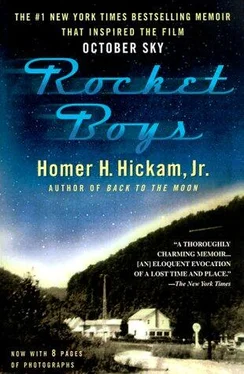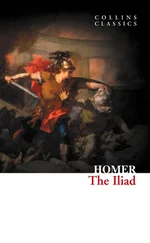have you ever sat by the railroad track
and watched the emptys cuming back?
lumbering along with a groan and a
whine—smoke strung out in a long gray line
belched from the panting injun’s stack
—just emptys cuming back.
i have—and to me the emptys seem
like dreams i sometimes dream—
of a girl—or munney—or maybe fame—
my dreams have all returned the same,
swinging along the homebound track
—just emptys cuming back.
—Angelo De Ponciano
After his forced retirement at age sixty-five, Dad stayed as a consultant with the company for five more years, living in the Club House. My mother moved to Myrtle Beach, finding at last the scene in her painting. When his lungs finally gave out and his miners refused to let him on the man-trip anymore, Dad joined her there.
In 1989, after completing a tiring mission, I took an extended vacation to the Caribbean. Before I left, I called my mother and father. Mom got on the phone and said Dad’s black lung had worsened. He was also depressed, Mom said, because the Coalwood mine had been shut down, the fans turned off, and the pumps deactivated. The mine was filling with water and would never be reopened again. When Dad talked to me, his voice was weak, but otherwise he sounded the same—confident and needing nothing, certainly nothing within my power to give him. Mom got back on the phone and said that, by all means, I should go on vacation, that everything was going to be fine, not to worry. I left them all the necessary telephone numbers where I could be reached and went ahead with my plans. While I was gone, Dad died. When I got home, Mom had already cremated him and scattered his ashes on the ocean she loved. I flew to Myrtle Beach and found her as I had always known her: fully in control and careful that I not be inconvenienced by my father, even in death.
I felt an odd serenity that Dad had died without my even being aware of it. In the nearly thirty years since I had left Coalwood, he and I had not been close. On trips back to Coalwood and later to Myrtle Beach, we gave each other warm greetings, spoke of the weather or the time to drive from my home to his, and left it at that. It was the way he wanted it, and I complied. Such visits, in any case, were for the purposes of visiting my mother, to present myself to her as the years went by for her inspection and approval.
I visited the hospital where Dad had spent his last hours. A sympathetic orderly talked to me, understanding that I wanted to be spared nothing. I had a need to know, even if the purpose of such knowledge was not evident to either of us. The medical answer was what I expected to hear: Dad had suffocated, the macroscopic coal and rock dust that clogged his lungs finally denying him even a scintilla of air.
The orderly spoke of my father as a little man, but he was not, not until his black lung made its final assault. In a space of a few short weeks, he had shrunk, literally collapsing around his lungs as they became the entire focus of his being.
And he had struggled. The orderly, and another, had to hold him down on the emergency-room gurney so the doctor could do what little there was to be done. Dad had clawed at his throat and his chest as if to rip them open. The orderly said his eyes stayed open to the end, and I could visualize those steel-blue eyes blazing. He had been alert until he died, the orderly said, and had shaken his head at the last, as if refusing a helping hand. I hoped he had fallen away with his mind intact and felt the warm envelopment of darkness, as if perhaps he had returned to his beloved deep mine for one last time. I hoped that the hand that had reached for him had been perhaps one of his foremen trying to bring him from the darkness into the light, and that he had recognized him and had at last reached out, had taken what was being offered.
But I doubted it. It wasn’t his way.
I made certain Mom was settled back into the house she loved, near the great brown strand of beach that runs along the Atlantic. She and Dad had recently gone through all the things they had carted off from Coalwood and boxed up items they felt either my brother or I might want. I came home, stuffed away the boxes she had given me, and my life kept going as if there had been no change. I had my work to do. The months changed to years. As time went by, I found myself thinking of Dad more and more, and I was troubled. Why had his death not caused me more pain? Why, instead, did I feel this odd sense of completion and reconciliation, as if everything between us had been settled long ago?
Feeling a need to connect with a past I had all but forgotten, I started to open the boxes Mom sent with me. All of them but one had Mom’s handwriting on it. I recognized Dad’s crabbed scrawl on a small brown cardboard box. Sonny , was all he had written. I opened it and there I found, carefully folded within layers of tissue paper, what I thought had been lost long ago—faded ribbons and medals and a strange artifact, a perfectly crafted steel De Laval rocket nozzle.
In November 1997, just before I retired from NASA, Dr. Takao Doi, an astronaut friend of mine, carried aboard space shuttle Columbia one of my science-fair medals and a piece of the Auk nozzle my father kept for me. It was a perfect launch, and as I watched the great ship blast off from the Cape Canaveral pad, I was filled with pride and happiness: The BCMA was finally going into space.
Sometimes now, I wake at night, thinking I have heard the sound of my father’s footsteps on the stairs, or the shuffling boots and low murmur of the hoot-owl shift going to work. In that half-world between sleep and wakefulness, I can almost hear the ringing of a hammer on steel and the dry hiss of the arc welder at the little machine shop by the tipple. But it is only a trick of my imagination; nearly everything that I knew in Coalwood is gone. Many of the miners’ houses there are deserted or falling into decay. The Club House sits in tired dilapidation, its roof no longer safe for telescopes. The great slack dump we called Cape Coalwood has been bulldozed, overgrown, browsed now by deer, silent to boyhood voices. The deep mine is abandoned, its tunnels flooded, the equipment inside covered with black water. Nothing commemorates the site, only rubble and faded signs in overgrown thickets where hundreds of men once toiled and sometimes died. Coalwood’s industrial symphony is forever stilled. All that remains are distant echoes and husks of what used to be.
Yet I believe for those of us who keep it in our hearts, Coalwood still lives. The miners still trudge up the old path to the tipple, and the people bustle in and out of the Big Store and gather on the church steps after Sunday services. The fences still buzz with news and gossip, and the mountains and hollows echo with the joyful clamor of childhood adventures. The halls and classrooms of the old schools still hum with the excitement of youth, and the football fields yet roar with celebration on cold fall Friday nights. Even now, Coalwood endures, and no one, nor careless industry or overzealous government, can ever completely destroy it—not while we who once lived there may recall our life among its places, or especially remember rockets that once leapt into the air, propelled not by physics but by the vibrant love of an honorable people, and the instruction of a dear teacher, and the dreams of boys.

Sonny Hickam at five years of age.

Visiting Poppy: ( l to r ): Grandmother “Mimi” Hickam, Frankie (my first cousin), Poppy (Dad’s father), me (in Poppy’s lap), Jim (my brother). Poppy’s legs were cut off in the mine.

Homer and Elsie Hickam, circa 1957.

The Coalwood Olga Coal Company tipple.

The Coalwood Mine: Mr. Bykovski’s small machine shop was located in the brick building at the lower right. Our house was just a hundred yards to the right of that building.

The Hickam house, located just a hundred yards from the Coalwood tipple. The road to the left leads to “downtown” Coalwood to the Big Store, the Club House, and the churches, and then on to Cape Coalwood.

The mine superintendent’s office at the Coalwood tipple. This is the building hit by one of the BCMA’s earlier Auks. Dad can be seen standing in the open door to the right.

Dad in the mine. For some reason, he didn’t wear his usual white foreman’s helmet on the day this photo was taken.

A Coalwood Olga Coal Company “man-trip,” the kind my dad and I rode in when he tried to convince me to become a mining engineer.

Typical Coalwood houses. Note the heavy-duty fence. It was this kind of fence around Mom’s rose garden that we blew up.

The Coalwood Community Church. We were whatever religion the company said we’d be. We were Methodists during the days of the Rocket Boys

Coalwood Community Church choir: This choir, which included the “Great Six” (the six schoolteachers of the Coalwood School), convinced the company to give the Rocket Boys our rocket range. Elsie Hickam (Mom) is seated in the far right of the first row. At the time of the Rocket Boys, Mom had quit the choir to be a Sunday school teacher.

A meeting of the Big Creek Missile Agency at Sonny’s house: (l to r): Sherman, O’Dell, and me. Note that we’re not wearing shoes. Mom was afraid we’d scratch her hardwood floors with the rocket propellant embedded in our shoes.

The Big Creek Missile Agency in the winter of 1959 (l to r): Me, Quentin, Roy Lee, and O’Dell. Sherman and Billy weren’t able to make it for the photo session. Mom took this photo, which ran in the McDowell County Banner and also The Owl , the high school newspaper. Note the misspelling of my name. The rocket shown is actually a mock-up that Quentin and I were using to study fin attachment methods. We never attempted to fly a rocket with these dimensions.

Yearbook photos, Big Creek High School Memoirs , 1960.

The only known photo of Daisy Mae, my friend and confidante during the days of the Rocket Boys.
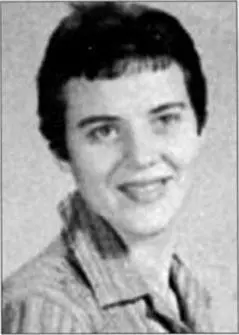
Miss Riley: Miss Riley was fierce in her belief that going to school was the job of her students and, therefore, sacred. To work as hard as possible at a job was the West Virginian way. To do a poor job was simply not acceptable. When I got arrogant because of my rocket successes, or in trouble for my failures, she kept me on an even keel with just a few words of appropriate admonishment or encouragement.
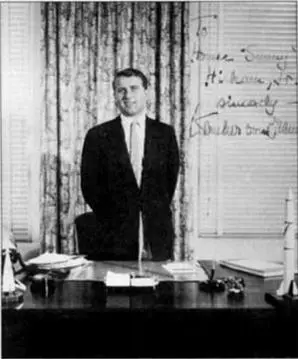
Dr. Wernher von Braun: The autographed photo that I received for Christmas, 1958.
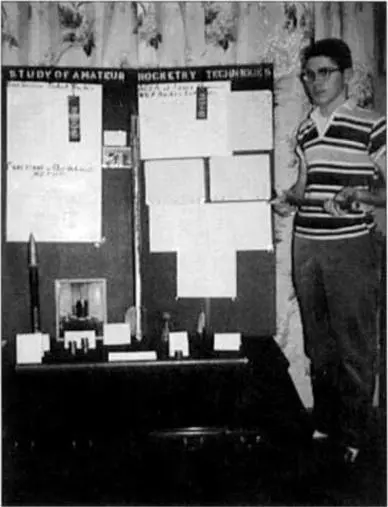
National Science Fair: That’s Auk XIV I’m holding in front of our National Science Fair display. Auk XXVIII is the long rocket standing in the center. The nozzles on the table, hurriedly machined after the strike was settled, arrived in Indianapolis just in time.
Читать дальше
Конец ознакомительного отрывка
Купить книгу
